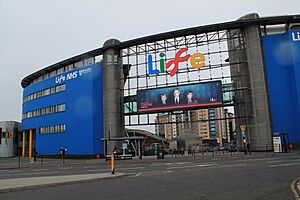Centre for Life facts for kids
 |
|

The northern entrance to the Centre for Life and Times Square
|
|
| Established | 2000 |
|---|---|
| Location | Times Square, Newcastle upon Tyne, England, NE1 4EP |
| Type | Science museum |
| Visitors | 225,000 visitors per year (as of 2010) |
| Public transit access | Railway, Bus, Metro |
| Nearest car park | Times Square Car Park |
The Centre for Life is a special science village located in Newcastle upon Tyne, England. It's a place where scientists, doctors, teachers, and business people all work together. Their goal is to make new discoveries in the life sciences—the study of living things.
The Centre is also a popular attraction for visitors, with lots of fun and educational things to see and do. It is a registered charity, which means it runs on donations and ticket sales, not money from the government.
Contents
History of the Centre
The Centre for Life was officially opened by Queen Elizabeth II in May 2000. It quickly became an important place for science and learning in the UK.
For several years, the Centre hosted the UK's Maker Faire. A Maker Faire is like a giant festival for inventors, artists, and tech fans. People come to show off their cool projects, from robots to homemade crafts. It was a perfect fit for a place that celebrates creativity and science.
What's Inside the Science Centre?
The Life Science Centre is the main visitor attraction. It's a hands-on museum where you can explore the wonders of science. The Centre always has something new to see, with a mix of permanent and temporary exhibitions. It also has a Science Theatre for live shows and a planetarium where you can journey through space.
Fun and Games: Exhibits and Activities
The Centre is designed to be fun and interactive. Here are some of the cool things you can do:
- Experiment Zone: Put on a lab coat and become a scientist for a day! Here, you can do real experiments like extracting DNA from plants.
- Brain Zone: This area is all about your amazing brain. You can learn how it works and test your own brainpower with fun challenges.
- Wow Zone: This zone is full of exciting, hands-on activities. You can use a giant catapult or pull yourself up high in a special pulley-powered chair.
The Centre also hosts major traveling exhibitions. In 2014, it featured the famous Body Worlds Vital exhibit. During the winter, the public square outside the Centre turns into a beautiful open-air ice rink for everyone to enjoy.
Important Medical Research
The Centre for Life is not just a museum; it's also home to important medical research that helps people.
Helping Families and Finding Cures
The Newcastle Fertility Centre, located here, helps couples who have difficulty having children. Scientists at the Centre also do important research to find new treatments for serious illnesses like diabetes, Alzheimer's disease, and Parkinson's disease.
To do this, they study stem cells. Stem cells are special cells that can turn into any other type of cell in the body, like a skin cell or a brain cell. By studying them, scientists hope to learn how to repair parts of the body damaged by disease. In 2005, scientists here were the first in Europe to clone a human embryo for research, a major step in understanding how life develops.
The Northern Genetics Service
The Centre is also home to the NHS Northern Genetics Service. This group helps doctors and families understand genetic diseases, which are illnesses passed down from parents to children. They work to find ways to reduce how often these illnesses occur and help people live healthier lives.
 | Janet Taylor Pickett |
 | Synthia Saint James |
 | Howardena Pindell |
 | Faith Ringgold |

